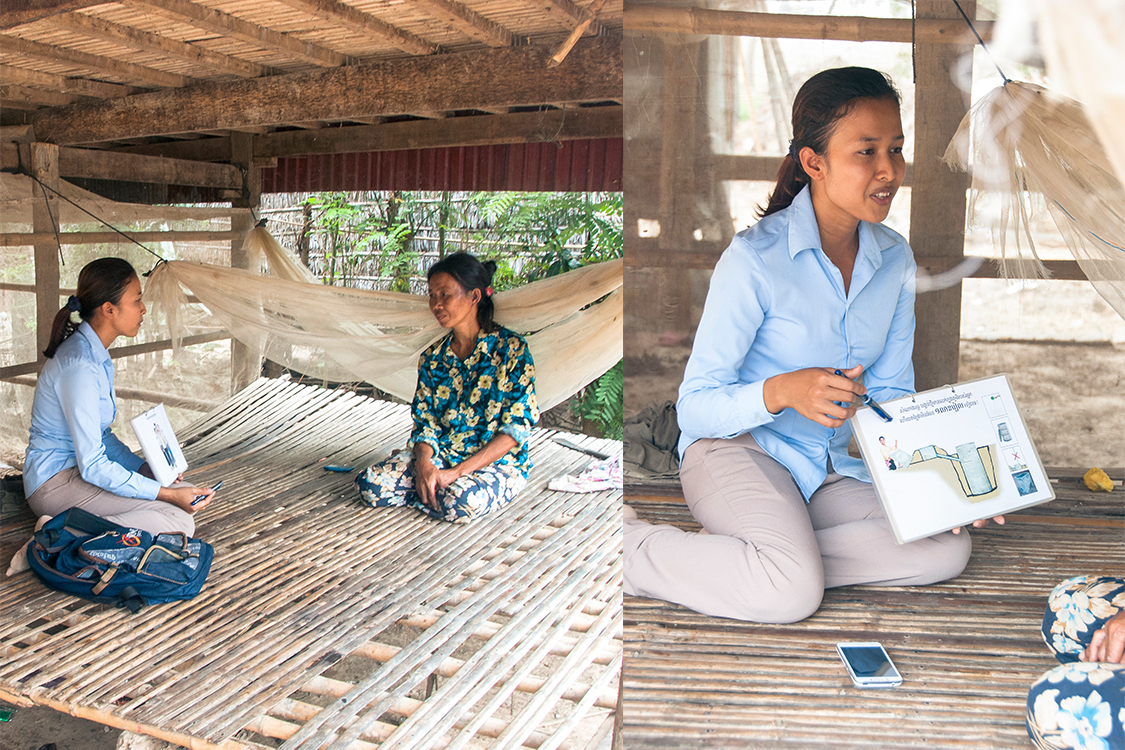Professionalizing the sales force

iDE Global WASH
A well-trained sales force and a standardized selling, training, and coaching process is critical for rapid uptake by households and replication in new locations.
With the support of Whitten & Roy Partnership (WRP), iDE developed a sales training approach that included systematic sales training and sales management processes and a package of supporting tools. Over the years, WRP has continued to support iDE’s efforts to professionalize its sales force by conducting situation assessments, training iDE staff in new sales methodologies, and providing programmatic recommendations.
LESSON LEARNED: A more direct model of market facilitation is needed to generate demand for sanitation.
iDE’s initial guiding theory was that households are willing to buy, and suppliers are willing to sell, an aspirational, accessible, and affordable latrine. With facilitation support, enterprises could learn how to profit from selling latrines. When iDE’s sanitation program began, we focused on the latrine business owner as the main actor driving demand for latrines and generating sales in order to reach more market segments in the rural communities.
The hypothesis was that these businesses, driven by profit, would be motivated to support active and direct sales. However, we discovered that latrine business owners have limited capacity and/or motivation to manage active sales and promotions of latrines.
Rather than individuals focused on latrines as a line of business, these businesses are usually concrete producers who make concrete rings that happen to be used for latrines. In response to this discovery, iDE pivoted to focus our market facilitation on directly recruiting and managing sales agents and coordinating with latrine businesses to match supply and demand.
LESSON LEARNED: Sales assessments can identify opportunities for strategic shifts to increase impact.
Although the pilot project exceeded the target of 10,000 latrine sales, sales capacity remained low. Five major challenges were found with the pilot model and practices:
- Field staff lacked adequate methods and know-how to train and mentor businesses without creating dependency.
- The three-month limit for training businesses was too short to adequately train businesses to be successful and independent.
- Group and direct sales were not being coordinated and managed effectively to leverage benefits of both.
- The absence of granular sales data limited the ability to understand sales problems and respond adequately.
- Sales agents used high-pressure, aggressive sales tactics that can sour the business reputation and create additional consumer resistance.
The following five solutions were recommended to address the challenges:
- Develop a transformational training course for sales agents, latrine businesses, and the project management team to learn effective sales and sales management strategies and tactics.
- Design a training course with a flexible deadline according to the needs and progress of each business.
- Devise a strategy for selling that will make the most of group and direct sales approaches.
- Help businesses realize the value of data collection and devise a simple collection process.
- Design an experiential event to help sales staff realize the importance of treating customers with respect and honesty and have them invent more sustainable, positive sales tactics.
The research had shown how ineffective current practices were and the impact that improved sales strategy and operations could make. The urgent need to revise the sales approach was unquestionable.
Under the new Human-Centered Sales™ [Footnote 1] approach, sales agents focus on selling to a customer’s problem, rather than selling on product features or price. If a customer has bought into the latrine as a solution to their problems, they are likely to be more satisfied with the product, use it properly and consistently, and recommend it to their friends and family. They are also willing to pay a higher price, which will motivate businesses and sales agents to continue selling.

LESSON LEARNED: Ongoing coaching, not just one-off training is key to success in sales and general management
Like any skill, sales skills need to be constantly reinforced. For the first several years of iDE’s sanitation program, district-level sales managers were responsible for providing training and coaching for sales agents. However, when the sanitation market began to saturate, sales became more difficult. Many of the remaining households without latrines had seen the program’s sales presentations before, or offered unique reasons for not purchasing a latrine immediately. In response, the program needed to increase the capacity of the sales agents so they could provide more tailored sales messages. Sales managers, who were tasked with recruitment, training, and management of day-to-day sales efforts, needed additional support to meet the advanced sales training needs of the program.
The Sanitation Marketing Academy
In 2016, WRP was vital to the development of a sales academy. Essentially a small group of dedicated trainers, the sales academy was formed to improve the competency of sales agents while reducing the training burden on sales managers. The objective of the academy was to regularly train new and old sales agents on sales methods and strategies.
It’s now called the Sanitation Marketing Academy and it has continued to function as an effective capacity development mechanism for our team, expanding its curriculum with additional training material on topics beyond sales such as supply management, gender, and workplace sensitivity. It has now more than doubled its team size and covers six knowledge areas: sales, technical training (i.e., on specific non-sales program activities), sanitation and hygiene principles, management & leadership, personal development, and gender equity/social inclusion. Having a dedicated team of trainers can support the delivery of regular, consistent standards of training while ensuring that program best practices are not lost over time with staff turnover or performance relapses.
Human-Centered Sales™ is a trademark of Whitten & Roy Partnership.